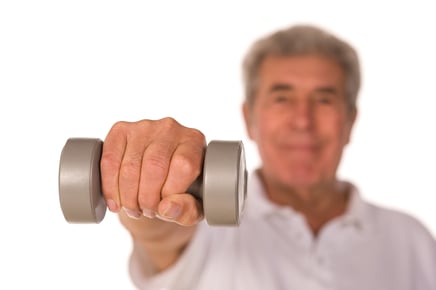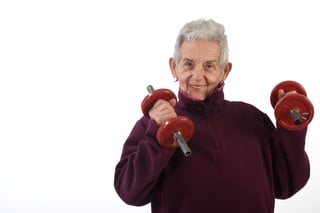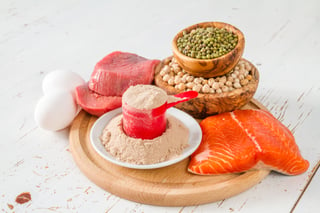
What is COPD?
Chronic Obstructive Pulmonary Disease (COPD) is a disease that causes breathlessness as a result of swelling and blockage of the airways in the lungs. It takes third place as the leading cause of death in the United States. COPD claims more than 120,000 lives each year in America alone according to this report. An estimate of 65 million people worldwide have moderate to severe COPD according to the World Health Organization (WHO). In the United States alone, over 12 million people are diagnosed with COPD and another 12 million believed to have it, and have no idea that they do.
In the year 2005 this report by WHO showed that over 3 million people lost their lives to COPD which corresponds to 5% of all deaths globally. The survival rate for patients diagnosed with COPD at a severe stage is in fact worse than that for patients diagnosed with many common cancers. The 5-year mortality rate for COPD patients ranges from 40% to 70% depending on how severe the disease is, while the 2-year mortality rate is about 50% for patients with severe COPD.
Causes of COPD
- smoking of cigarettes
- pipes
- cigars
- second hand smoke
- exposure to chemicals and fumes at your place of work
- long-term pollution exposuer
- inhaling of dust over time can also lead to the development of COPD.
Many patients diagnosed with COPD experience unwanted loss of weight. People in their severe stages of COPD have a harder time gaining weight and are usually prone to more weight loss. It is estimated that one out of every four people who suffers from COPD has a less-than-optimal body weight. A patient with COPD burns approximately 430 to 720 calories daily by contracting and expanding their muscles involved in breathing. A person without a respiratory disease can burn approximately 100 calories a day while breathing. Weight loss in COPD can be attributed to depression, lack of appetite and the energy required in breathing.
Building Muscle Mass When Battling COPD
Working Out
 To support healthy breathing and reduce flare-ups, building muscle mass and maintaining it is very crucial. It may be more difficult to work out in the advanced stages of COPD; you can however do it if you take it really slow, with not too much pressure. If you start exercising in your early stages, it will help you build a healthy habit as well as contribute to the reduction of future problems when exercising. Some exercises to try that will help you build muscle mass include bicep curls, wall push-offs and squats. You should however seek advice from your doctor before taking up any exercise routine so that they may advice on compatibility.
To support healthy breathing and reduce flare-ups, building muscle mass and maintaining it is very crucial. It may be more difficult to work out in the advanced stages of COPD; you can however do it if you take it really slow, with not too much pressure. If you start exercising in your early stages, it will help you build a healthy habit as well as contribute to the reduction of future problems when exercising. Some exercises to try that will help you build muscle mass include bicep curls, wall push-offs and squats. You should however seek advice from your doctor before taking up any exercise routine so that they may advice on compatibility.
You can also exercise training with supplemental oxygen. Research from the journal respirology showed that this approach resulted in significant weight gain and muscle mass. Researchers monitored 22 COPD patients with moderate to very severe stages of COPD that were underweight. The study took a 12-week period where patients were taken through pulmonary rehabilitation. This consisted of exercise training, breathing retraining, self-management skills and proper use of medication. Throughout the course of the exercise training, oxygen was administered at 3 LPM for all participants.
Eat 6 Meals Every Day

Eating six smaller meals everyday helps to increase the intake of calories which helps in the building of muscle mass. Meals that are high in protein and healthy fats are recommended. Larger meals are more time consuming to prepare and might make you feel too full making it harder for you to breathe. Smaller meals are quicker to prepare. Preparation of smaller meals in advance helps make it easier to grab something when you are hungry.
Use of Supplements
The intake of supplements such as protein supplements can help with the building of muscle mass. You can whip up a quick protein shake after a workout and add a fruit of your choice to enhance the flavor. Talk to your doctor or nutritionist before you purchase any supplements. They will help advice the impact it has on your diet and whether you should be using them in the first place. Some supplements are not good for you because they contain more sugar than nutrients. Your doctor can help highlight which ones you should stay away from.
Start with Dessert
It is harder to eat when you have COPD, since you are already having a hard time breathing. This can make the experience unpleasant and make eating an activity you do not look forward to. Indulge in a little dessert first to put some joy into eating. A great way to bulk up on protein and fat while having dessert is eating desserts like ice-cream, cake, pudding and custard which are often made with eggs.
Increase Your Protein Intake
 Foods rich in protein help build muscle mass. Protein-rich foods include; Lean meats which are lower in saturated fats and cholesterol compared to other meats, eggs which are a plus as they don’t take much time when preparing and are full of healthy nutrients and nuts which are a concentrated source of proteins and healthy fats. Nuts also help fight inflammation because they are packed with antioxidants. You can simply spread peanut butter on toast or make scrambled eggs to benefit from these foods.
Foods rich in protein help build muscle mass. Protein-rich foods include; Lean meats which are lower in saturated fats and cholesterol compared to other meats, eggs which are a plus as they don’t take much time when preparing and are full of healthy nutrients and nuts which are a concentrated source of proteins and healthy fats. Nuts also help fight inflammation because they are packed with antioxidants. You can simply spread peanut butter on toast or make scrambled eggs to benefit from these foods.
Conclusion
To develop a healthy diet and strategy to exercise, work with your physician possibly in combination with your medication. Use a scale to help you find out how many calories you need to take on a daily basis to help you achieve you muscle mass gain goals. It is important for COPD patients’ calorie-intake to match their increased workload; this will help to avoid weakening of the respiratory muscles and the diaphragm. It is also recommended for a patient with COPD to join pulmonary rehabilitation ; this program will help them improve their physical condition as well as provide proper nutrition counseling needed for monitoring COPD.



